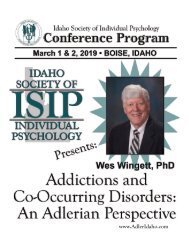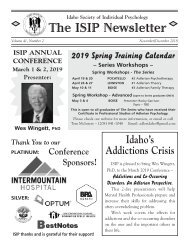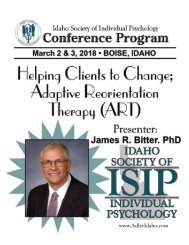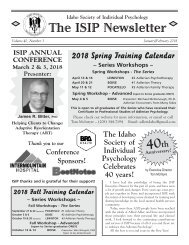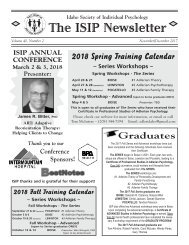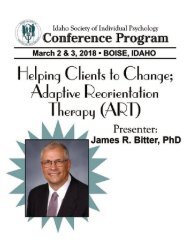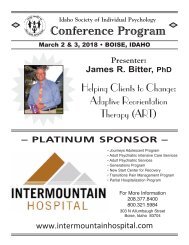June 2022 ISIP Newsletter
You also want an ePaper? Increase the reach of your titles
YUMPU automatically turns print PDFs into web optimized ePapers that Google loves.
- Series Workshops - Fall Workshops - The Series
We will be offering all 3 Series workshops in the fall of 2022
September 16-17 - Idaho Falls Workshop 1 presented by Brad Lambson
September 30, October 1st - Boise, Workshop 3 presented by Steve Maybell
October 21-22 - Coeur d’Alene Workshop 2 presented by Brad Lambson
Advanced Workshop October 14-15 with Wes Wingett in Boise at the Riverside
- 2023 Annual ISIP Conference (In February) -
We are excited to announce our presenter for the 2023 Conference will
be Jon Sperry! We will be holding our annual conference in-person at The
Riverside Hotel and virtually through Zoom on February 24-25th, 2023.
Certificate in Professional Studies of Adlerian Psychology.
Please check our website www.AdlerIdaho.org for more information, or email or call
Dave Webster – (208) 681-3283 Email: adleridaho@gmail.com
e Idaho Society of Individual Psychology (ISIP) has been in existence since 1977, having turned 45 years of
age recently. Alfred Adler said, “Essentially, Individual Psychology is a method of limitless encouragement”.
ISIP has been fortunate to have had a long list of notable encouragers participate as trainers at our conferences,
our advanced trainings and our series trainings. Due to the
quality of trainers, ISIP is now recognized as the NASAP affiliate
that provides the most trainings in the United State. is is largely
due to the work of Tom McIntyre and Dale Babcock. eir
untiring efforts have contributed so much to ISIP’s success. Tom
served as the Executive Director of ISIP for decades. He is retired
from ISIP now, but serves as an advisor to the Board of Directors.
He is much appreciated by ISIP. ank you Tom.
We suffered a loss in May of 2019 with the passing of Dale
Babcock, who had served as ISIP’s training director for many
years. Dale was known as “the heart of ISIP”. He was loved by so
many and gave love to countless souls in return. ISIP members
who were fortunate enough to attend Dale’s trainings know just what a valuable asset and friend he was. Dale
participated in a very successful day-long training in Twin Falls two weeks before his passing. Oh, how we miss
him, but oh how fortunate we are to have known him.
ISIP’s efforts involve training teachers, counselors, social workers, foster parents, parents and other human
services elds. Our annual training conferences have been ongoing since 1978. e board of directors of ISIP
selects our presenters and sends board members to the North American Society of Adlerian Psychology annual
conferences to seek out trainers. Our presenters are energetic, intelligent, and do demonstrations of Adlerian
techniques and practices.
In 2001, “e Series” was started as ISIP’s effort to train its
members. We were fortunate to have Dr. Stephen Maybell develop
and present our series workshops. Steve was mentored by Robert
Powers who studied with and was mentored by Rudolf Dreikurs.
Steve’s materials have made ISIP’s series training successful and
very informative. e series consists of eory of Personality
Development and Family Functioning, Adlerian Psychotherapy
and Adlerian Family erapy. Steve continues to assist ISIP’s series
in the Treasure Valley. Steve, you are highly valued by ISIP!
Aer several years of ISIP producing numerous series graduates, ISIP developed the Advanced Series
workshops, bringing in remarkable talent from across North America. One of ISIP’s most frequent Advanced
2
Series presenters is Wes Wingett of Norfolk, Nebraska. His style, talent, encouragement, wisdom and Love for
ISIP has been so helpful. Adler stated, “ere is a law that man should love his neighbor as himself. In a few
hundred years it should be as natural to mankind as breathing or the upright gait…”. Wes does well at modeling
that brotherly love. ank you Wes.
Relatively recently, Bradley Lambson, of Idaho Falls, has been providing
series training workshops. Participants give Brad high ratings — Brad is
a skilled therapist and talented trainer. anks Brad. e ISIP series is in
good hands with your assistance.
In summary, e Idaho Society of
Individual Psychology has a rich history of
providing encouraging and intellectually
stimulating techniques and ideas to its membership. Individual Psychology
gets “the water to the end of the row” when it comes to healing the human soul.
Quoting Adler once more, in describing his approach to healing the psyche, he
said, “In Individual Psychology, during its mild barrage of questions, the erring
person experiences grace, redemption, and forgiveness by becoming a part of
the whole”. ere are many practitioners in ISIP who have observed what Adler
describes.
ank you all for being here at this conference.
Written by Ted Warstadt, ISIP Historian
3
People are holistic and must be viewed not only through the body-mind connection but
also through their cognitions, emotions, and behaviors to understand them and their
movement through life.
Here are some thoughts about the fourth of nine
principles of Adlerian psychology. ese nine principles
are based on my study and personal interpretations of the
theory and practice of Adlerian psychology. Before writing
about the fourth principle, here is a synopsis of the rst
three principles.
e rst principle focuses on the social nature of
humans and their nding a place of cooperation and contribution in family, school, community, and beyond.
e second principle focuses on personal creativity, self-determination, decision making ability, and ownership
of personal thoughts, feelings, and behaviors. e third principle focuses on the development of personal
strategies for moving through life based on personal perceptions of self, others, events, and the direction
deduced from those perceptions about how to go about living in a social setting.
e fourth principle states: People are holistic and must be viewed not only through the bodymind
connection but also through their cognitions, emotions, and behaviors to understand them and their
movement through life. Adler began his meetings with Sigmund Freud and other colleagues in 1902 and le
the Freudian group in 1911. Part of the intellectual divorce between Freud and Adler centered on whether
human beings could be psychologically divided into three parts, the id, ego, and super-ego as ascertained
by Freud or Adler’s ideas that human beings are indivisible, that is, they are whole and need to be viewed as
such. Hence, the name of Adler’s psychology is known as Individual Psychology, focusing on the whole and
undivided person.
As a child. Alfred Adler had rickets, a vitamin deciency, that resulted in being unable to walk
comfortably until age four, he had pneumonia at age 6, and he decided to become a physician at a young age.
As a physician he was concerned about the personal perception of physical and other medical challenges
faced by individuals and what the individuals thought, felt, and did about their physical challenges or organ
inferiorities. Adler’s theory and practice partially focused on how the individual compensated for any physical
challenges.
In addition to the personal perception of organ inferiorities, Adlerian
psychology is concerned about the attitude and behaviors of others toward
individuals diagnosed with a physical or medical challenge. Did others pamper
or neglect the individual with the physical or medical challenge?
“Trust only movement” is an o repeated Adlerian adage. “I will trust the
tongue in your shoes not the tongue is your mouth” and “I will trust what you
do, not what you say you are going to do” are phrases that focus on movement.
To understand self and others, Adlerians focus on the direction, speed,
and goal or purpose of individuals. Where is the individual going? What is the
speed of the movement? What is the goal of the behavior?
4
Maybell Memos
Theory of
Human Behavior:
• e indivisible person......(holism),
• indivisible from the social world......(social embeddedness, social systems),
• strives toward self created goals of signicance, security and success......(teleology),
• based on a private philosophy of life......(cognition, private logic, lifestyle).
e lifestyle is created on the basis of necessity – for the child must immediately begin the process of
orienting to the social world, and does so by creating meanings of what life is like, what others are like, what
facilitates and impedes success, and what the child him/herself is like and is capable of. Since the rst conclusions
are formulated in childhood, they become the foundation of the lifestyle. Since the vantage point of all early
conclusions is from the small, weak, inexperienced child, there are always mistakes made in the meaning given
to life and the self-image is always distorted to some extent by feelings of inferiority. e growing and developing
child compensates for these feelings through the creation of compensatory goals for success, which like other
conclusions are likely to be mistaken to some degree.
e lifestyle, which is created at a pre-verbal level and never formulated into clear concepts, operates at
an unconscious level. All future experiences are interpreted in accordance with the lifestyle and all future actions
are guided by its laws. As social beings, effective living means effective social living. In the rapidly changing
and democratic world in which we live, the mandatory life tasks of work, love and friendship in their unending
challenge, require condence, courage and an approach to relating founded on the iron clad rule of social living
– equality. An approach to social relationships based on respect for self, respect for others, and the working out
of mutual agreements toward the enhancement of our shared lives, is the only approach, which results in real
success, on the useful side of life.
e model for “mental health” is where the lifestyle meanings and goals of an individual are facilitative of
successful social living and include a sense of belongingness, a valuing of self and others, autonomy and courage,
and compensation for natural feelings of inferiority through goals which include self development in line with
social enhancement (Gemeinschasgefuhl -Social Interest). Such a person is prepared for effective social living
based on mutual respect, and can meet life’s changes, challenges and losses with signicant inner and outer
resources.
Human dysfunction has as its foundation a lifestyle with distorted meanings (mistaken ideas) and
extreme feelings of inferiority (inferiority complex) compensated for by narrow and exaggerated goals of
personal signicance, security and success (supe-riority complex). is foundation leaves the person vulnerable
to life’s challenges, changes and losses (exogenous factors). Dysfunctional behavior occurs as the lifestyle is
unable to accommodate to the challenges with necessary exibility, courage and cooperation. In the place of
exibility, distorted meanings lead to hesitation and limited options for problem solving. In contrast to courage
and condence, a sense of failure and despair is eminent as the narrowly dened goals become impossible to
retain. Cooperation is replaced by the self-elevation and self-protective requirement of the style, further limiting
the individual’s resources and leading to avoidance, dependency or contention. e specic symptoms or
dysfunctional patterns emerge as an expression of defeat and discouragement or as compensatory solutions –
efforts to regain a position of personal safety and superiority in line with lifestyle convictions, while safeguarding
the self-esteem.
Relationship dysfunction occurs whenever an effort exists to create or maintain superiority/inferiority
dynamics, regardless of the nature of the relationship. Both sociological and psychological realities support
the inevitably of disharmony which exists in all relationships of inequality. Sociological trends recognize the
growing and unyielding development of democracy and equality in all our social institutions. Added to this
the psychological movement of all persons that proceeds from the status of inferiority to a position of selfenhancement,
and it is clear that no human being will agree to occupy a position of social inferiority, but will
strive always to overcome this position. is is the basis for human conict. © 1993 Steven A. Maybell, PhD
5
He was noted to be very caring and attentive with
children. Adler observed, “I have investigated what
children in poor neighborhoods feared the most,
and found that in most cases, it was whipping”. is
recognition of the hardships of childhood poverty,
along with other observations, led Adler to develop
child guidance principles based on the assumption of
equality and mutual respect. Adler felt it important
that children learn at a young age that they possess
‘equality of being’ – that they are each a contributing
and important part of life, and that they are connected
to others.
Contributing to Common Sense
by: Ted Warstadt
Recently members of Idaho’s Adlerian
organization have inquired as to what ISIP’s direction
might be in ameliorating issues of social justice and
the marginalization of various groups. is article
does not suggest a position statement for ISIP on
social justice or other maladies facing local, county,
state or national social issues; it simply provides some
of Alfred Adler’s teachings, most of which are in his
own words, to perhaps guide an individual’s efforts as
they seek to maintain and teach equality and mutual
respect.
Across the world we see numerous situations of social
injustice. Many examples of marginalization can be
found with individuals, groups, races, religions, tribes,
political groups and even
whole countries. Alfred
Adler was particularly
empathic regarding the
need to support the
marginalized.
Ted Warstadt
6
Adler began his career
as a physician, and he
worked mainly with
the poor in Vianna.
A term Adler frequently used to identify optimal
wellness in social and societal functioning is ‘common
sense’ – the common weal, the good of society. Sophie
DeVries, one of Adler’s students, reected on Adler’s
idea of common sense in these words: “ere is quite a
bit of difference, between intelligence, that is used for
personal goals, and common sense, which is ‘meaning’
that is of benet to mankind.” Common sense
encompasses the good of all as opposed to the ‘private
logic’ which is self-interested and egoic. Adler referred
to “false individualism” as those identifying themselves
as apart from others. When common sense and
private logic appose one another, emotional wellness
suffers and, oen, so do others. ose who are in
relationships with a selsh or despotic person oen
pay a heavy emotional price for that involvement. In
a lecture given in Berlin, June 7, 1930, Adler quipped,
“Up to now, common sense has been under-valued out
of misunderstanding, especially by those who are not
well endowed with it”. at message is applicable to
our current national and world situation.
Alfred Adler used the term gemeinshasguful to
describe social feeling. In an effort to more fully dene
social feeling (gemeinshasguful), he stated “I have
found in an English author a phrase which expresses
clearly what could contribute to our explanation. ‘To
see with the eyes of another, to hear with the ears
of another, to feel with the heart of another.’ For the
time being, this seems to me an admissible denition
of what we call social feeling”. Adler felt strongly
that optimal mental health was closely aligned with
one’s interest in their fellow beings and he warned of
maladies that occur when individuals act selshly. He
stated, “It is the individual who is not interested in
his fellow men who has the greatest difficulties in
life and provides the greatest injury to others. It is
from among such individuals that all human failures
spring”. He added, “All failures … are failures because
they are lacking in fellow-feeling and social interest”.
It is common sense to see equality as a given, and
mutual respect toward one’s fellow beings as a societal
essential. Adler was a gentle, loving, inspiring,
feeling man. His wisdom and insight continue to
be invaluable. His understanding of the seriousness
of humanity’s need to connect, and the existential
imperative to love others, is succinctly articulated
in his statement: “ere is a Law that man should
love his neighbor as himself. In a few hundred years
it should be as natural to mankind as breathing or
the upright gait; but if he does not learn it he must
perish.”
Adler not only saw connection to others as important,
he indicated that each soul is connected to all life.
Sophie de Vries said, “Adler sees man as a totality,
belonging to a larger whole. He goes as far as seeing
him as part of the cosmos, which is an innite
thought”. at statement has philosophical and
spiritual implications.
THE ISIP 2022
BOARD OF DIRECTORS
President- David Teed
President Elect - Jon Moses
Secretary - Stacie Cooper
Past President - Ric Boyce
Treasurer - Julene Coston
Historian - Ted Warstadt
Member-at-Large - Rodney Dotson
Member-at-Large - Tom McIntyre
Member-at-Large - Susan Keeley
Member-at-Large - Gretchen Brill
Executive Director - Dave Webster
In summary, studying the psychology and writings
of Alfred can perhaps be a buffer for individuals
seeking to maintain connection in an increasingly
divisive world. Albeit many challenging situations
and injustices exist, encouragement continues to
be an available resource to take on the ongoing and
upcoming challenges. Encouragement is found is the
psychology of Alfred Adler. He said of his approach
to helping other, “Essentially, Individual Psychology
(Adlerian Psychology) is a method of limitless
encouragement.”
7
8
ISIP would like to thank the continued support
of our sponsors. We are grateful for the past
support these sponsors have given to the ISIP
Society and it’s members.
9







